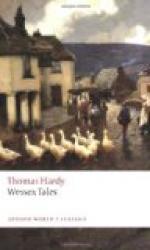‘It would—it would, indeed,’ he said hastily. ’I am not right in doing this, and I won’t do it again.’
’It is a very common folly of human nature, you know, to think the course you did not adopt must have been the best,’ she continued, with gentle solicitude, as she followed him to the door of the room. ’And you don’t know that I should have accepted you, even if you had asked me to be your wife.’ At this his eye met hers, and she dropped her gaze. She knew that her voice belied her. There was a silence till she looked up to add, in a voice of soothing playfulness, ’My family was so much poorer than yours, even before I lost my dear father, that—perhaps your companions would have made it unpleasant for us on account of my deficiencies.’
‘Your disposition would soon have won them round,’ said Barnet.
She archly expostulated: ’Now, never mind my disposition; try to make it up with your wife! Those are my commands to you. And now you are to leave me at once.’
‘I will. I must make the best of it all, I suppose,’ he replied, more cheerfully than he had as yet spoken. ’But I shall never again meet with such a dear girl as you!’ And he suddenly opened the door, and left her alone. When his glance again fell on the lamps that were sparsely ranged along the dreary level road, his eyes were in a state which showed straw-like motes of light radiating from each flame into the surrounding air.
On the other side of the way Barnet observed a man under an umbrella, walking parallel with himself. Presently this man left the footway, and gradually converged on Barnet’s course. The latter then saw that it was Charlson, a surgeon of the town, who owed him money. Charlson was a man not without ability; yet he did not prosper. Sundry circumstances stood in his way as a medical practitioner: he was needy; he was not a coddle; he gossiped with men instead of with women; he had married a stranger instead of one of the town young ladies; and he was given to conversational buffoonery. Moreover, his look was quite erroneous. Those only proper features in the family doctor, the quiet eye, and the thin straight passionless lips which never curl in public either for laughter or for scorn, were not his; he had a full-curved mouth, and a bold black eye that made timid people nervous. His companions were what in old times would have been called boon companions—an expression which, though of irreproachable root, suggests fraternization carried to the point of unscrupulousness. All this was against him in the little town of his adoption.
Charlson had been in difficulties, and to oblige him Barnet had put his name to a bill; and, as he had expected, was called upon to meet it when it fell due. It had been only a matter of fifty pounds, which Barnet could well afford to lose, and he bore no ill-will to the thriftless surgeon on account of it. But Charlson had a little too much brazen indifferentism in his composition to be altogether a desirable acquaintance.




